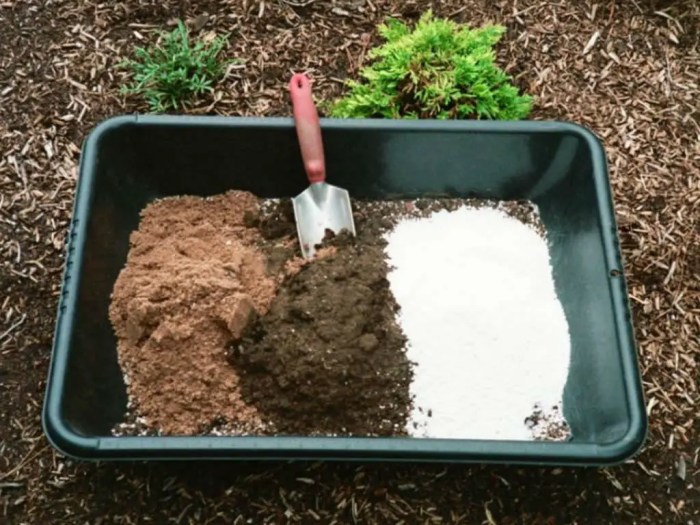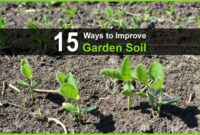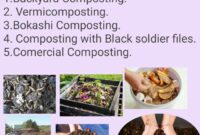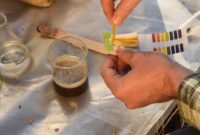How to make rich garden soil – a crucial aspect for thriving plants – is explored in this engaging overview. Discover the key nutrients, components, and methods to enhance your garden soil effectively.
Importance of Soil Health

Having rich garden soil is essential for the healthy growth of plants. The quality of soil directly impacts the availability of nutrients and water to plants, which are crucial for their development.
Looking for some creative DIY vertical garden ideas to spruce up your outdoor space? Vertical gardens are a great way to maximize space and add a touch of greenery to any area. Whether you have a small balcony or a large backyard, there are plenty of ideas to suit your needs.
Key Nutrients for Plant Growth
Plants require several key nutrients to thrive in soil, including:
- Nitrogen: Essential for leafy growth and overall plant vigor.
- Phosphorus: Important for root development, flower, and fruit production.
- Potassium: Aids in disease resistance and overall plant health.
- Calcium: Helps to build strong cell walls in plants.
- Magnesium: Necessary for chlorophyll production and photosynthesis.
Role of Soil pH
The soil pH level plays a significant role in creating optimal growing conditions for plants. Different plants have specific pH preferences, and soil pH affects the availability of nutrients to plants. A pH level that is too high or too low can lead to nutrient deficiencies, impacting plant growth and overall health.
If you’re interested in learning how to start raised bed gardening , you’re in the right place. Raised bed gardening is a popular method for growing plants, vegetables, and herbs. It offers many benefits, including improved soil quality, better drainage, and easier access for planting and weeding.
Components of Rich Garden Soil: How To Make Rich Garden Soil
When it comes to creating fertile garden soil, there are several key components that play a crucial role in supporting plant growth and health.
Organic Matter
Organic matter, such as compost, manure, and plant residues, is essential for enriching the soil. It provides nutrients for plants, improves soil structure, and enhances microbial activity. Incorporating organic matter into the soil helps retain moisture, promotes beneficial soil organisms, and increases nutrient availability for plants.
Aeration
Aeration is another vital component of healthy soil. It involves the movement of air through the soil, which helps roots access oxygen and facilitates the breakdown of organic matter. Proper aeration prevents soil compaction, improves drainage, and promotes root growth. This allows plants to uptake nutrients more effectively and reduces the risk of waterlogged conditions.
Drainage
Good drainage is essential for healthy soil and plant growth. Excess water in the soil can lead to root rot, nutrient leaching, and poor aeration. Ensuring proper drainage through well-draining soil, raised beds, or adding amendments like perlite can prevent waterlogging and create optimal conditions for plant roots to thrive.
By understanding and incorporating these components into your garden soil, you can create a rich and fertile environment that supports the growth of healthy and vibrant plants.
Methods to Improve Soil Quality

Improving soil quality is essential for maintaining a healthy garden and promoting plant growth. There are several methods that can be employed to enhance the fertility and structure of the soil.
Composting to Enrich Garden Soil
Composting is a natural way to recycle organic waste and create nutrient-rich soil for your garden. By combining kitchen scraps, yard waste, and other organic materials, you can produce compost that is full of beneficial microorganisms and nutrients. This organic matter helps to improve soil structure, retain moisture, and provide essential nutrients for plant growth.
- Start by creating a compost pile or using a compost bin in a suitable location in your garden.
- Layer green materials (such as fruit and vegetable scraps, grass clippings) with brown materials (such as dried leaves, straw) to maintain a balanced carbon-nitrogen ratio.
- Regularly turn the compost pile to aerate it and speed up the decomposition process.
- After several months, your compost will be ready to use as a soil amendment to enrich the quality of your garden soil.
Cover Cropping for Soil Improvement
Cover cropping involves planting specific crops during the off-season to cover and protect the soil. These cover crops help to prevent erosion, suppress weeds, and improve soil fertility by adding organic matter when they are eventually turned into the soil. Cover cropping also enhances soil structure, increases microbial activity, and promotes nutrient cycling.
- Choose cover crops that are suitable for your climate and soil type, such as legumes, grasses, or brassicas.
- Plant cover crops in the fall or early spring and allow them to grow until they are ready to be incorporated into the soil.
- When the cover crops have reached maturity, cut them down and either till them into the soil or use them as mulch to protect the soil surface.
- Regularly rotate cover crops to maximize the benefits they provide to the soil and improve overall soil health.
Using Natural Fertilizers to Enhance Soil Fertility
Natural fertilizers, such as compost, manure, and organic amendments, are valuable resources for improving soil fertility without the use of synthetic chemicals. These fertilizers provide essential nutrients to plants, improve soil structure, and promote beneficial microbial activity in the soil. By using natural fertilizers, you can maintain a healthy soil ecosystem and support sustainable gardening practices.
- Apply compost to your garden beds each season to replenish nutrients and improve soil structure.
- Use aged manure from livestock or poultry as a nutrient-rich soil amendment to boost fertility.
- Consider incorporating organic amendments like bone meal, kelp meal, or fish emulsion to provide specific nutrients to your plants.
- Avoid overusing synthetic fertilizers that can harm soil biology and lead to nutrient imbalances in the soil.
Testing and Amending Soil

When it comes to creating rich garden soil, testing and amending the soil are crucial steps to ensure optimal plant growth and health. Conducting a soil test can help determine nutrient levels and identify any deficiencies that need to be addressed.
Conducting a Soil Test
Soil testing involves collecting a sample from different areas of your garden and sending it to a laboratory for analysis. The results will provide valuable information on the pH level, nutrient content, and soil composition. You can purchase DIY soil testing kits or contact your local agricultural extension office for professional testing.
Amending Soil Based on Test Results, How to make rich garden soil
Once you receive the soil test results, you can determine the specific amendments needed to improve soil quality. Common amendments include adding organic matter such as compost, manure, or peat moss to enhance soil structure and fertility. Adjusting the pH level with lime or sulfur may also be necessary based on the test results.
Addressing Common Soil Deficiencies
Common soil deficiencies like nitrogen, phosphorus, and potassium can be addressed by adding fertilizers or organic amendments rich in these nutrients. For example, bone meal can provide a good source of phosphorus, while blood meal is high in nitrogen. It’s important to follow the recommendations from the soil test results to effectively address any deficiencies and promote healthy plant growth.
In conclusion, mastering the art of creating rich garden soil is essential for a successful garden. By implementing the discussed techniques, you can ensure optimal plant growth and a flourishing garden space.
Curious about the benefits of raised bed gardening ? Raised beds can help prevent soil compaction, provide better drainage, and make it easier to control weeds. They also offer a higher yield of crops and are easier to maintain than traditional garden beds.




